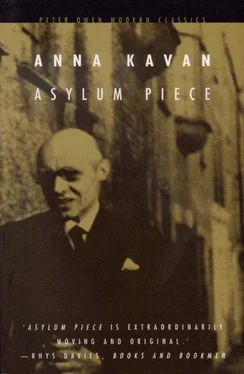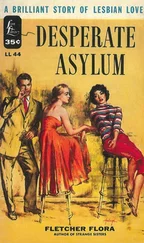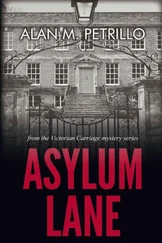The card players, having once displayed their dim inquiry, without further interest in what is passing lethargically continue the game which they have been ordered to play, dealing and receiving the cards with gestures as automatic as those of the hands of so many clocks. The Professor rustles the page of his newspaper. The three on the steps sit motionless, deriving some incommunicable solace from each other’s proximity and from the fugitive sense of escape.
Suddenly a flock of pigeons flies up from the direction of the lake and circles low in front of the terrace with bright flashing wings. And immediately, as if stricken into life at the sight of those beating wings, the three rise from the steps with one simultaneous lamentable cry.
Now it can be seen only too clearly where their mutual and horrid resemblance lies. What appeared as slender elegance now reveals itself as emaciation, hip bones protrude shockingly through the covering clothes, cheek bones have almost pushed their way through the reluctant flesh.
The long, lank, match-thin limbs with their enlarged joint mechanisms jerk into forlorn obedience to the Professor’s wires as, like a smiling puppet-master, he hurriedly takes control. And from behind the three pairs of dark spectacles large tears roll over the painted marionette cheeks and slowly drip on to the stone terrace.
I had a friend, a lover. Or did I dream it? So many dreams are crowding upon me now that I can scarcely tell true from false: dreams like light imprisoned in bright mineral caves; hot, heavy dreams; ice-age dreams; dreams like machines in the head. I lie between the bare wall and the medicine bitter with sediment in its dwarfish glass, and try to recall my dream.
I see myself walking hand-in-hand with another, a human being whose heart and mind had grown into mine. We walked together on many roads, in sunshine beside ancient olive trees, on hillsides sprayed as by fountains with the larks’ singing, in lanes where the raindrops dripped from the chilly leaves. Between us there was understanding without reservations and indestructible peace. I, who had been lonely and incomplete, was now fulfilled. Our thoughts ran together like greyhounds of equal swiftness. Perfection like music was in our united thoughts.
I remember an inn in some southern country. A crisis, long since forgotten, had arisen in our lives. I remember only the cypresses’ black flames blowing, the sky hard as a blue plate, and my own confidence, serene, unshakable, utterly secure. ‘Whatever happens is trivial so long as we are together. Under no circumstances could we fail one another, wound one another, do one another wrong.’
Who shall describe the slow and lamentable cooling of the heart? On what day does one first observe the infinitesimal crack which finally becomes a chasm deeper than hell?
The years passed like the steps of a staircase leading lower and lower. I did not walk any more in the sun or hear the songs of larks like crystal fountains playing against the sky. No hand enfolded mine in the warm clasp of love. My thoughts were again solitary, disintegrate, disharmonious — the music gone. I lived alone in a few pleasant rooms, feeling my life run out aimlessly with the tedious hours: the life of an old maid ran out of my fingertips. I arranged the flowers in their vases.
Yet still, intermittently, I saw him, the companion whose heart and brain once seemed to have grown to mine. I saw him without seeing him, the same and yet not the same. Still I could not believe that everything was lost beyond hope of salvage. Still I believed that one day the world would change colour, a curtain would be ripped away, and all would be as it once was.
But now I am lying in a lonely bed. I am weak and confused. My muscles do not obey me, my thoughts run erratically, as small animals do when they are cornered. I am forgotten and lost.
It was he who brought me to this place. He took my hand. I almost heard the tearing of the curtain. For the first time in many months we rested together in peace.
Then they told me that he had gone. For a long while I did not believe it. But time passes by, and no word comes. I cannot deceive myself any longer. He has gone, he has left me, and he will not return. I am alone for ever in this room where the light burns all night long and the professional faces of strangers, without warmth or pity, glance at me through the half open door. I wait, I wait, between the wall and the bitter medicine in the glass. What am I waiting for? A screen of wrought iron covers the window; the house door is locked though the door of my room is open. All night long the light watches me with its unbiased eye. There are strange sounds in the night. I wait, I wait, perhaps for the dreams that come so close to me now.
I had a friend, a lover. It was a dream.
Hans comes out of the lift and crosses the hall of the clinic. Just beside a large vase of salmon-pink gladioli which stands on a table, he remembers that he has left the door of the lift open. He turns back and closes it very carefully, then slowly crosses the wide hall again. He is a small, slim man, quite young, with pointed ears and black hair that grows in a point on his forehead. His brown eyes, which nature intended to be gentle and mischievous, are now gentle and sad. His whole expression is one of barely concealed anxiety which shows also in the undecided steps of his shiny black shoes. He is smartly, if rather unsuitably, dressed in a dark town suit.
A woman in a white uniform wishes him good morning from her desk near the main door. He answers mechanically, without seeing her. At the door he hesitates for several moments: it is difficult for him to pass through it although it is standing open. Finally he manages to overcome his inhibition and goes outside. On the steps he again hesitates, not being able to decide which direction to take.
The sun shines brilliantly. Before him is a parklike expanse of grass with groups of trees and some single fine Wellingtonias dotted about. There is nobody in sight. It is eleven o’clock and all the patients who are well enough are at work in the atelier or in different parts of the grounds.
Hans glances round uneasily. It is part of his routine, too, to work in the atelier at this hour. Until a few days ago someone would certainly have come to investigate his absence: but now nobody comes near him; nobody seems to care how he occupies his time. This strikes him as exceedingly ominous. ‘My brother must have written to say that he can’t afford to keep me here much longer. Soon I shall be sent away from the clinic — and then what will become of me?’
He sighs and takes from his pocket a crumpled letter which he has been carrying about for several days. It is from his brother in Central Europe and contains nothing but bad news about the factory upon which the family fortune depends — strikes, unemployment, rising price of raw materials. The whole village also depends upon the factory; the whole village is suffering.
Hans sighs again deeply and returns the letter to his pocket without unfolding it. He takes out his dark spectacles and puts them on, hiding from the brightness of the day which fills him with obscure alarms.
Suddenly his face changes. A girl of about twenty is approaching him on a bicycle. She is the gymnastic teacher with whom, up to a few days ago, Hans has been indulging in a mild flirtation. Now he feels far too anxious to think of flirting, although he admires automatically the beautiful golden tan of her bare arms and legs. She carries a black swimming suit over the handlebars of her cycle.
‘How I wish she would ask me to go swimming with her!’ he thinks to himself, as a smile of eager anticipation appears on his face. It is not that he really wants to swim in the lake; but what he longs for above everything at this moment is laughter, companionship and a friendly voice.
Читать дальше












